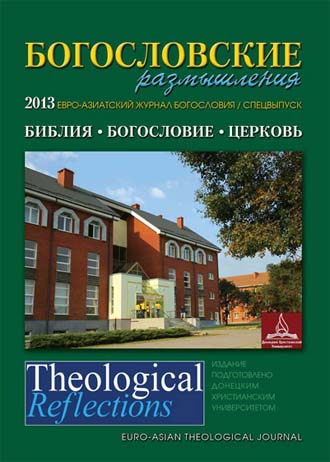Призвание Авраама – начало миссии Бога
Keywords:
Призвание Авраама, Божья миссия, обетования Аврааму,Abstract
Данная статья сфокусирована на изучении ветхозаветного отрывка, повествующего о призвании Авраама, с целью представить данный эпизод Священной истории как начальный этап миссии Бога, нацеленной на восстановление взаимоотношений между Богом и человечеством. В первой части автор представляет краткий обзор первобытной истории, который позволяет увидеть «фатальность человеческого положения», а также острую нужду в благословении Божьем: поскольку человечество все дальше отдалялось от своего Творца, Бог пожелал вмешаться в ход истории и предотвратить неминуемую гибель Своего творения. Более подробному описанию данного события посвящена вторая часть статьи, которая утверждает, что главной особенностью Божьей миссии является то, что Сам Бог является ее инициатором и «главным действующим лицом», однако при этом следует учитывать и тот факт, что Бог призывает избранного Им человека к сотрудничеству. Он дает обещания патриарху, часть из которых, несмотря на сомнения последнего, осуществилась еще при его жизни. Однако, вместе с тем достаточно ясно видно долгосрочную и универсальную перспективу этих обетований, окончательное осуществление которых можно увидеть в служении Иисуса Христа.
The article focuses on the examination of the Old Testament passage which narrates about the calling of Abraham in order to present this episode of the Sacred History as the initial phase of the missio Dei aiming to restore the relationship between God and humanity. In the first part the author presents an overview of the primitive history, which is intended to reveal the "fatality of the human condition" and humanity’s urgent need of God's blessing. Since humanity had gradually drifted apart from their Creator, God wished to intervene in the course of history and prevent the imminent destruction of His creation. The second part of the article is dedicated to a more detailed description of this event. The main feature of God's mission is the fact that God is the initiator and its "main character", but at the same time one has to take into consideration that God calls the man whom He has chosen to cooperation with Him. God gives the patriarch several promises, and some of them are being realized during his lifetime in spite of his doubts. Moreover, we can see quite clear a long-term and universal perspective of these promises, whose ultimate realization can be seen in the ministry of Jesus Christ.
References
- “yAG.” In The Hebrew and Aramaic Lexicon of the Old Testament. Edited by Ludwig Koehler, Walter Baumgartner, 182-183. Vol. 1. Leiden, New York, Koln: E.J.Brill, 1994.
- Anderson, B.W. “Abraham, the Frend of God.” Interpretation 42, no. 4 (Oktober 1988): 353-66.
- Arnold, Bill T. Genesis. Cambridge: University Press, 2009.
- Engelsviken, T. “Missio Dei: The Understanding and Misunderstanding of a Theological Concept in European Churches and Missiology,” International Review of Mission, vol. 92, no. 367 (October 2003): 481.
- Friedman, Richard Elliott. Commentary on the Torah. New York: HarperCollins Publishers, 2001.
- Gruneberg, Keith N. Abraham, Blessing and the Nations. Berlin, New York: Walter de Gruyter, 2003.
- Hamilton, Victor P. The Book of Genesis, Chapters 1-17. The New International Commentary on the Old Testament, edited by R.K. Harrison and Robert L. Hubbard, Jr. Grand Rapids: William B. Eerdmans Publishing Company, 1990.
- Hicks, W. Bryant. “Old Testament Foundations for Missions.” In Missiology, edited by J.M. Terry, E. Smith and J. Anderson. Neshville: Broadman & Holman Publishers, 1998.
- Hoehner, David M. “Genesis 15: 6: A Histiry of Interpretation.” Master’s thesis, Dallas Theological Seminary, 1998.
- Kahn, Pinchas. “The Mission of Abraham: Genesis 18:17-22:19”. The Jewish Bible Quarterly 30, no. 3 (119) (July-September 2002):155-163.
- McKeown, J. “Blessing and Curses.” In Dictionary of the Old Testament: Pentateuch, edited by T. Desmond Alexander and David W. Baker, 83-87. Downers Grove: InterVarsity Press, 2003.
- __________. Genesis. Grand Rapids: William B. Eerdmans Publishing Company, Michigan/Cambridge, U.K., 2008.
- Miller, Patrick D., Jr. “Sintax and Theolohy in Genesis XII 3a.” Vetus Testamentum 34, no. 4 (October 1984): 472-475.
- Muilenburg, J. “Abraham and the Nation: Blessing and World History.” Interpretation, no.19 (1965): 387-98.
- Okoye, J.C. Israel and the Nation. New York: Orbis Books, Maryknoll, 2006.
- Rad, von G. Genesis. Philadelphia: Westminster Press, 1972.
- Senior, D. and Stuhlmueller, C. The Biblical Fundations for Mission. London: SCM Press, 1983.
- Speiser, E.A. “People and Nation of Israel.” JBL 79 (1960): 157-163.
- __________. Genesis. The Anchor Bible. Edited by William Foxwiss Albright and David Noel Freedman. Vol. 1. Garden City, New York: Doubleday & Company, 1964.
- Waltke, Bruce K. and M. O’Connor. An Introdaction to Biblical Hebrew Syntax. Winona Lake: Eisenbrauns, 1990.
- Waltke, Bruce K. Genesis: A Commentary. Grand Rapids: Zondervan, 2001.
- Wenham, G.J. Genesis 1-15. World Biblical Commentary. Vol. 1. Edited by David A. Hubbard and Glenn W. Barker. Waco: Word Books Publisher, 1987.
- Westermann, C. Genesis 12-36: A Commentary. Translated by John J. Scullion. Minneapolis: Augsburg, 1985
- Wolff, H.W. “The Kerygma of the Yahwist.” Interpretation, no. 20 (1966): 131-58.
- Wright, Ch.J.H. The Mission of God. Downers Grove: Inter-Varsity Press, 2006.
Downloads
How to Cite
Issue
Section
License
Copyright (c) 2020 Андрей ПЛАТОВСКИЙ

This work is licensed under a Creative Commons Attribution-NonCommercial 4.0 International License.
All articles published in the Journal are distributed under a Creative Commons Attribution-NonCommercial 4.0 International License
By submitting an article for publication in Theological Reflections: Eastern European Journal of Theology the author grants the editors the right to publish the article and distribute it in electronic and print form.
The author reserves all copyrights and the right to use the materials of the article in whole or in part for educational purposes, to write his own dissertations, to prepare abstracts, conference reports, oral presentations, etc., as well as post electronic copies of articles (including the final electronic version downloaded from the journal’s official website) on non-commercial web-resources without the consent of the editorial board and founders.



